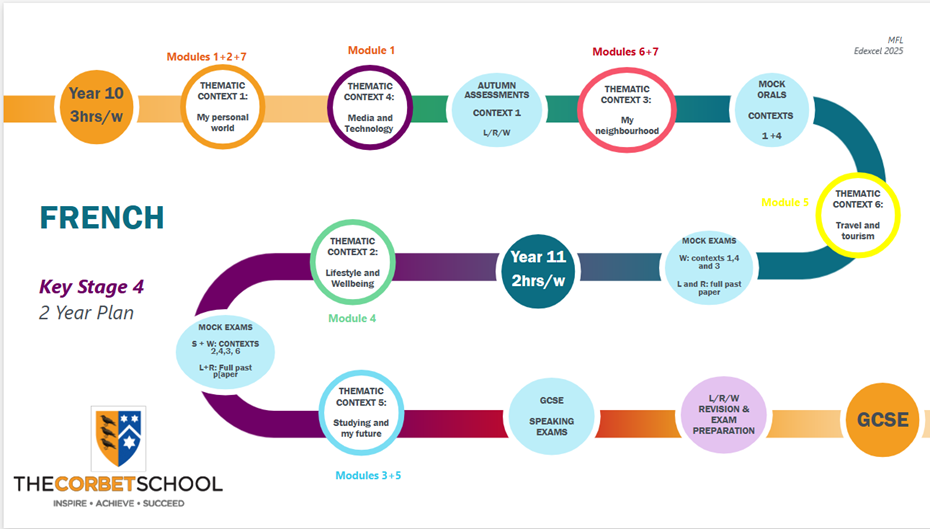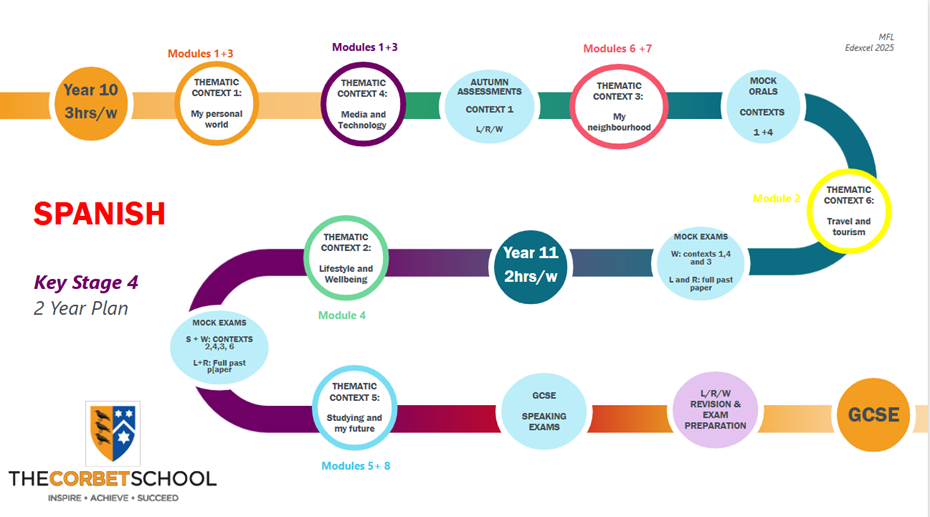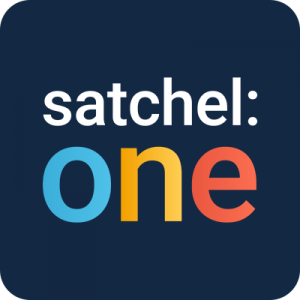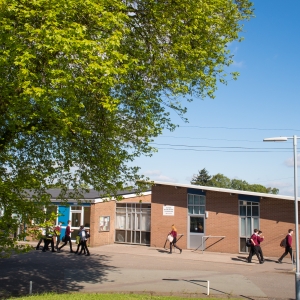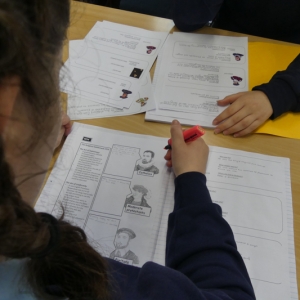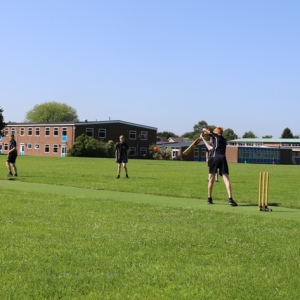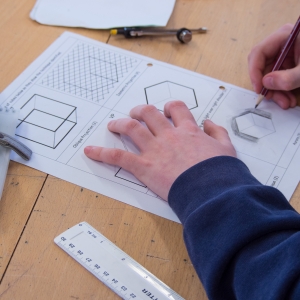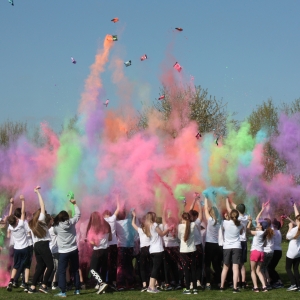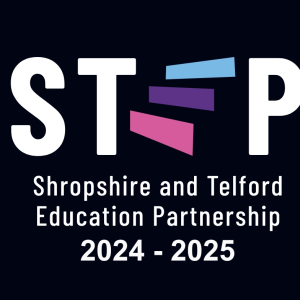During Years 10 and 11, pupils will pursue a broad and balanced timetable, according to the requirements of the school and the National Curriculum.
Most subjects are compulsory but there is some element of choice. The Options process takes place in Year 9 where pupils are asked to select three subjects they would like to study in Years 10 and 11 in addition to their compulsory curriculum. We try to cater for all pupils and their preferences.
The English Language GCSE course assesses descriptive/narrative writing as well as non-fiction writing where pupils will have to write to present a specific viewpoint. Pupils will have to demonstrate an understanding having read a range of different texts including one literature fiction text, one modern non-fiction text and one C.19 literary non-fiction text. The Spoken Language aspect of the course will be assessed within class and will involve pupils presenting ideas and responding to questions in front of a peer group audience.
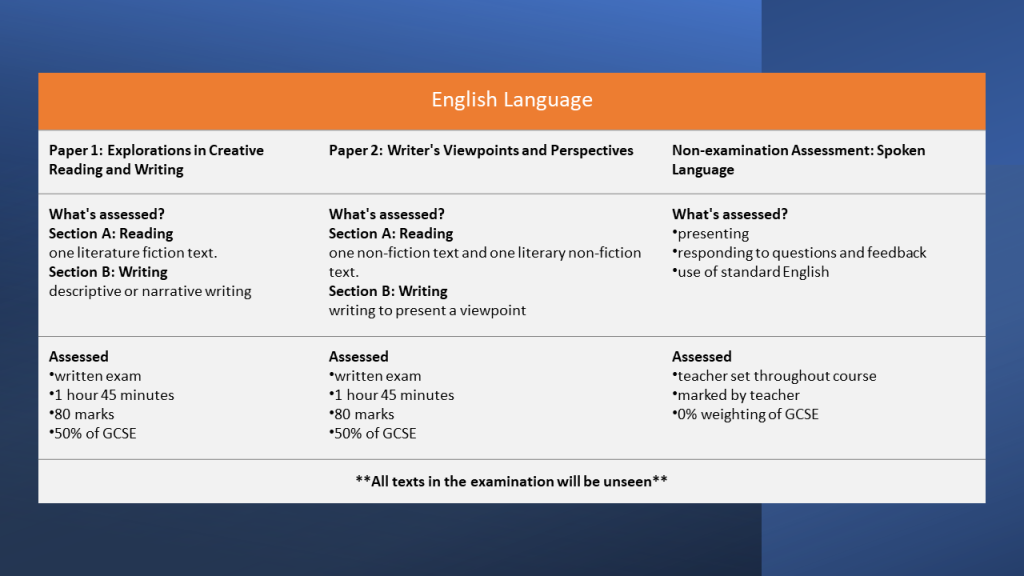
Specification:
In English Literature, pupils will study a range of texts including a play by Shakespeare, a 19th century novel, a modern play or novel and a range of different poetry.
 Specification:
Specification:
All pupils in year 10 will begin a course leading to examination at GCSE using the Pearson Edexcel Level1/Level2 GCSE (9-1) in Mathematics (1MA1) Specification. Each pupil will study one of two levels:
| Level in Syllabus | Target Grades |
| Foundation | 1, 2, 3, 4, 5 |
| Higher | 4, 5, 6, 7, 8, 9 |
| Paper 1 | ||
| Non calculator | worth 33 1/3 % | Duration: 1 hour 30 minutes |
| Paper 2 | ||
| Calculator | worth 33 1/3 % | Duration: 1 hour 30 minutes |
| Paper 3 | ||
| Calculator | worth 33 1/3 % | Duration: 1 hour 30 minutes |
| Topic | Foundation % | Higher % |
| Number | 22-28 | 12-18 |
| Algebra | 17-23 | 27-33 |
| Ratio, Proportion and Rates of Change | 22-28 | 17-23 |
| Geometry and Measures | 12-18 | 17-23 |
| Probability & Statistics | 12-18 | 12-18 |
| Assessment objective | Foundation % | Higher % |
| Use and apply standard techniques | 50 | 40 |
| Reason, interpret and communicate mathematically | 25 | 30 |
| Solve problems within mathematics and other contexts | 25 | 30 |
Pupils who do not take the separate science option, will work towards a double GCSE qualification in science as follows: There will be 6 exams (two for each science); each exam will be 1 hour and 15 minutes and out of 70 marks. Each paper will contribute 16.6% to overall award of two GCSE grades.
The exams will measure how pupils have achieved the following assessment objectives:
- AO1: Demonstrate knowledge and understanding of: scientific ideas; scientific techniques and procedures.
- AO2: Apply knowledge and understanding of: scientific ideas; scientific enquiry, techniques and procedures.
- AO3: Analyse information and ideas to: interpret and evaluate; make judgments and draw conclusions; develop and improve experimental procedures.
There are two tiers of assessment:
The qualification will be graded on a 17-point scale: 1–1 to 9–9 – where 9–9 is the best grade. A pupil taking Foundation Tier assessments will be awarded a grade within the range of 1–1 to 5–5. Pupils who fail to reach the minimum standard for grade 1–1 will be recorded as U (unclassified) and will not receive a qualification certificate.
A pupil taking Higher Tier assessments will be awarded a grade within the range of 4–4 to 9–9. A pupil sitting the Higher Tier who just fails to achieve grade 4–4 will be awarded an allowed grade 4–3. Pupils who fail to reach the minimum standard for the allowed grade 4–3 will be recorded as U (unclassified) and will not receive a qualification certificate.
Specification:Separate Sciences (Options subject)
Pupils who study this course will gain GCSE's in the 3 separate sciences, biology, chemistry and physics, which are independent of each other and could be taken at different tiers.
Who is it for?Pupils who have enthusiasm for science and a curiosity for the world around them. Pupils who would like the opportunity to study science in greater depth and breadth than the compulsory science course. It is strongly recommended for pupils who wish to pursue a career in science, medicine or engineering.
Pupils following this course will ideally be making expected progress to achieving their target grades ibn science and mathematics. Assessment for each separate science is as follows:- Two written exam papers both 1 hour 45 minutes and out of 100 marks.
- Each paper will be worth 50% towards the single GCSE.
- Pupils must study all 3 sciences and therefore will have a total of 6 exams leading to the award of 3 separate GCSE.
- Foundation and Higher Tiers will be available just like the double award, but each science will have a separate score from 1-9, (1-5 Foundation and 4-9 for Higher). Pupils can take separate tiers for each subject.
- Pupils follow a two-year French course leading to entry for the full GCSE. The course covers and assesses the four skills of Listening, Reading, Speaking and Writing. The GCSE course builds on topics, skills and grammar rules which have been learned in years 7 - 9. Pupils have the opportunity of developing their language skills in different contexts and they are able to build up a more extensive knowledge of linguistic structures and vocabulary.
- The emphasis of the GCSE course is to enable candidates to use French for successful communication. A pass at GCSE grade 6 or above also provides a sound basis for continued language learning to Advanced Level French. The GCSE offers a choice of interesting topic areas for the writing and speaking examinations and topics are taught using a range of methods to engage pupils in their language learning. All four skills of Writing, Speaking, Listening and Reading are assessed via summative examinations at the end of the two-year GCSE course, in the Summer Term of Year 11.
Subject content:
Pupils study all of the following thematic contexts on which the exams are based.- My Personal World
- Lifestyle and Wellbeing
- My neighbourhood
- Media and technology
- Travel and tourism
- Studying and my future
Assessments:
GCSE French has a Foundation Tier (grades 1-5) and a Higher Tier (grades 4-9). Pupils must take all four question papers at the same tier. All question papers must be taken in the same series.Paper 1: Speaking (25% of the GCSE)
- Non-exam assessment
- Foundation tier: 7-9 minutes + 15 minutes preparation time.
- Higher tier: 10-12 minutes + 15 minutes preparation time.
- 50 marks
Paper 2: Listening and understanding (25% of the GCSE)
- Written exam
- Foundation tier: 45 minutes
- Higher tier: 60 minutes
- 50 marks
Paper 3: Reading and understanding (25% of the GCSE)
- Written exam
- Foundation tier: 45 minutes
- Higher tier: 60 minutes
- 50 marks
Paper 4: Writing (25% of the GCSE)
- Written exam
- Foundation tier: 1 hour 15 minutes
- Higher tier: 1 hour 20 minutes
- 50 marks
Specification and resources Links:
- Specification link: Pearson Edexcel GCSE French (2024) | Pearson qualifications
- Past papers link: French GCSE Past Papers | Revision World Please be aware that the first exams of this format start in June 2026. Using any past papers for revision is good practice.
- Revision guide link: Pearson Revise Edexcel GCSE French: Revision Guide incl. audio, quiz & video content - for 2026 and 2027 exams (new specification): Amazon.co.uk: Glover, Stuart: 9781292739700: Books
- Revision workbook link: Pearson Revise Edexcel GCSE French Revision Workbook - for 2026, 2027 exams: Amazon.co.uk: Glover, Stuart, Smith, Harry: 9781292739731: Books
- Foundation French textbook link: Edexcel GCSE French Foundation Student Book (GCSE MFL 2024 for Edexcel): Amazon.co.uk: Bell, Clive, Hockaday, Tom, Mayes, Eleanor: 9781292466590: Books
- Higher French textbook link: Edexcel GCSE French Higher Student Book (GCSE MFL 2024 for Edexcel): Amazon.co.uk: Bell, Clive, Hockaday, Tom, Mayes, Eleanor: 9781292734675: Books
- Homework website links: Sign in | Pearson and Language Gym - Home
- Pupils follow a two-year Spanish course leading to entry for the full GCSE. The course covers and assesses the four skills of Listening, Reading, Speaking and Writing. The GCSE course builds on topics, skills and grammar rules which have been learned in years 7 - 9. Pupils have the opportunity of developing their language skills in different contexts and they are able to build up a more extensive knowledge of linguistic structures and vocabulary.
- The emphasis of the GCSE course is to enable candidates to use Spanish for successful communication. A pass at GCSE grade 6 or above also provides a sound basis for continued language learning to Advanced Level Spanish. The GCSE offers a choice of interesting topic areas for the writing and speaking examinations and topics are taught using a range of methods to engage pupils in their language learning. All four skills of Writing, Speaking, Listening and Reading are assessed via summative examinations at the end of the two-year GCSE course, in the Summer Term of Year 11.
Subject content:
Pupils study all of the following thematic contexts on which the exams are based.- My Personal World
- Lifestyle and Wellbeing
- My neighbourhood
- Media and technology
- Travel and tourism
- Studying and my future
Assessments:
GCSE Spanish has a Foundation Tier (grades 1-5) and a Higher Tier (grades 4-9). Pupils must take all four question papers at the same tier. All question papers must be taken in the same series.Paper 1: Speaking (25% of the GCSE)
- Non-exam assessment
- Foundation tier: 7-9 minutes + 15 minutes preparation time.
- Higher tier: 10-12 minutes + 15 minutes preparation time.
- 50 marks
Paper 2: Listening and understanding (25% of the GCSE)
- Written exam
- Foundation tier: 45 minutes
- Higher tier: 60 minutes
- 50 marks
Paper 3: Reading and understanding (25% of the GCSE)
- Written exam
- Foundation tier: 45 minutes
- Higher tier: 60 minutes
- 50 marks
Paper 4: Writing (25% of the GCSE)
- Written exam
- Foundation tier: 1 hour 15 minutes
- Higher tier: 1 hour 20 minutes
- 50 marks
Specification and resources:
- Specification link: Pearson Edexcel GCSE Spanish (2024) | Pearson qualifications
- Past papers link: Spanish GCSE Past Papers | Revision World Please be aware that the first exams of this format start in June 2026. Using any past papers for revision is good practice.
- Revision guide link: Pearson Revise Edexcel GCSE (9-1) Spanish Revision Guide: Amazon.co.uk: Halksworth, Vivien, Smith, Harry: 9781292739687: Books
- Revision workbook link: Pearson Revise Edexcel GCSE Spanish Revision Workbook - for 2026, 2027 exams: Amazon.co.uk: Halksworth, Vivien, Smith, Harry: 9781292739748: Books
- Foundation Spanish textbook link: Edexcel GCSE Spanish Foundation Student Book (GCSE MFL 2024 for Edexcel) : Lillington, Christopher, Reeves, Leanda, Gomez, Silvia: Amazon.co.uk: Books
- Higher Spanish textbook link: Edexcel GCSE Spanish Higher Student Book (GCSE MFL 2024 for Edexcel) : Lillington, Christopher, Reeves, Leanda, Gomez, Silvia: Amazon.co.uk: Books
- Homework and revision website links: Sign in | Pearson and Language Gym - Home
- develop competence to excel in a broad range of physical activities
- are physically active for sustained periods of time
- engage in competitive sports and activities
- lead healthy, active lives.
What does Physical Education in years 10 & 11 involve?
- In a similar format to Years 7 to 9, pupils will follow a balanced programme of sporting and physical activities.
- Pupils will further develop their physical and social skills, and personal confidence through a variety of physical activities.
- Pupils will develop leadership skills and responsibility through leadership activities.
- Opportunities for competitive sports and co-operative activities which improve pupils fitness.
- Pupils will often be given responsibility for their own learning and development.
What sports or physical activities will pupils experience in years 10 and 11?
These are some of the areas which we aim to offer:- Athletics
- Badminton
- Boxercise
- Cricket
- Dance
- Fitness
- Football
- Netball
- Rounders
- Rugby
- Table Tennis
- Tennis
What is expected of pupils in Physical Education lessons during years 10 & 11?
- As in Key Stage 3, pupils will be expected to bring and change into correct Physical Education kit for each of their lessons – whether they are actively participating or not.
- Pupils should put maximum effort and concentration into each of their Physical Education lessons and good behaviour is expected throughout.
- It is essential that pupils take part in every possible Physical Education lesson, as this will benefit their physical, social and mental health, and help support them with their academic learning.
- If for any genuine reason pupils are unable to do so, they will be expected to participate in the lesson by taking on another role such as referee or coach.
- Developing as a citizen
- Personal, social, health & economic education
- Economic wellbeing
- Financial capability
- Careers education & guidance
- To support the growth of self-awareness, self-confidence and a positive self-image.
- To provide pupils with access to information and guidance relevant to their personal and working lives.
- To help pupils to communicate with others about their concerns, needs and views.
- To help pupils appreciate the concerns, needs and views of others.
- To develop understanding of effective decision making and planning.
- To assist pupils in making the transition from school to adult life.
Personal, Social, Health & Economic Education
This is divided into three main areas:- Personal Wellbeing - understanding yourself and handling relationships units cover: developing identity and image, managing emotions, relationships, coping with crisis, challenging offensive behaviour, managing study time, developing own values, marriage and commitment, parenthood and parenting.
- Personal Wellbeing - keeping healthy units cover: healthy eating, safer sex and contraception, drinking, smoking, health matters, managing stress and dealing with depression, drugs, emergency first aid.
- Economic Wellbeing & Financial Capability units cover: thinking ahead, planning your future, managing your money, financing businesses, enterprise challenge, the UK economy, the global economy.
Citizenship
Aim: To help understand how to play a full part as a citizen in British Society and as a citizen of the world. This is divided into topics: Britain - a diverse society, human rights, rights and responsibilities, the law, crime and punishment, government, media matters, working for change, global challenges (environmental, war, terrorism, poverty, health and education) and community projects.- a creative individual who has the ability in, and enjoys drawing
- are self-motivated and enjoy independent study
- wish to enhance their skills in presenting work creativity and with flair, editing and combining portfolio work
- have a passion for Art and Design.
Component 1: Portfolio/coursework (60%)
Coursework will be completed in lessons and is teacher guided, this is worth 60% of the final assessment.Component 2: Externally set task (40%)
In the spring term of Year 11, pupils begin their externally set task. The OCR exam board offers 5 themes to students. Students select a theme of their choice and will spend approximately 10 weeks in developing a portfolio of work that explores the theme, covering the three GCSE art assessment objectives of observation, development, research. Students will then sit a 10 hour exam i the art rooms, which takes place over the course of two days. During the exam, students will complete a final response based upon their externally set task theme portfolio.Specification:
Exams
There is a 1 hour 30 minute exam that assesses pupil's knowledge of construction technology. 40% of the total grade. Exam board set and marked.Assessments:
There are three units of assessment:- Construction technology (40% exam) - this component will examine the different forms of construction that can be used for low-rise buildings (up to 5.2 meters in height) offices, retail units and homes. Pupils will develop a detailed understanding of how walls, floors, roofs and external works are constructed and pupils will be able to name each component part, along with its functions. Pupils will also learn about site management and organisation.
- Construction in Practice (Carpentry and joinery) (30% Portfolio) -This component will introduce pupils to commonly used hand tools, equipment and craft skills needed in creation of the built environment and how to select and use materials in order to safely produce quality outcomes. Pupils will complete an assessed practical activity in carpentry and joinery from an assessment set by the exam board. Pupils will showcase their applied knowledge and understanding in addition to their practical skills in this craft.
- Construction and design (30% portfolio) - Pupils will create a developed deign brief and generate some concept ideas for a building that could meet with client's approval. These ideas may have to fit in with the style of traditional buildings within a local space or could be more modern contemporary design. These concepts are developed into a final design solution that use several graphical communication methods, including sketching skills.
- A Levels
- A vocational qualification at level 3, in construction which will prepare pupils to enter employment or apprenticeships, or to move on to higher education by studying a degree in the construction or engineering sectors.
Specification:
GCSE Computer Science is a course designed for those pupils who wish to investigate how computers and the internet work, as well as pupils enjoying problem solving and wish to learn to code and write computer programs. This course will count towards the English Baccalaureate qualification.
Topics and assessment
Exam Paper 1: Principles of Computer Science
1 hour 30 minutes (75 marks) 50% of the final grade.- Computational Thinking - understanding what algorithms are, what they are used for and how they work. Pupil will learn how to follow, amend and write algorithms.
- Data - understand how and why computers use binary
- Computer Systems - understanding of the key hardware and software components which makeup computer systems
- Networks - understanding of networks and network security.
- Issues and impact - awareness of the emerging trends and technology in computing, and the impact of computing on individuals, organisations and society.
Exam Paper 2: Application of Computer Thinking
2 hours (75 marks) 50% of the final grade- Problem solving with programming - use computational thinking and problem solving skills to read, write, improve and evaluate programs. This exam takes place onscreen, and students will be given six programming tasks to complete.
Specification:
OCR Level 2 Cambridge National Certificate in Creative iMedia is a hands-on qualification for those looking to develop and hone creative ICT, Graphics and Media Skills. Pupils will build upon skills they have learnt at Key Stage 3 and will be able to use software packages to produce products for a set audience or purpose. Pupils will also investigate how the media industry works focussing on film, music, theatre, journalism, games and literature. The course is split into three units which include: Unit 1:Creative iMedia in the Media Industry
- Focus on film, TV, radio, print, gaming, the web, digital advertising
- Factors influencing product design
- Pre-production planning
- Understanding brand identity
- Planning digital graphics
- Creating a visual identity an a digital graphic
- Study Digital Games Concepts
- Learn Game Making Skills
- Plan and produce a digital game.
- Assessment consists of 3 units
- One written examination and two coursework units which are internally assessed and externally moderated.
- Unit 1 has a 1 hour written exam.
- Units 2 and 3 are coursework units. Work is assessed in school and moderated by the exam board. Approximately 17 hours of work in each unit, not including preparation work.
- Unit 3 is chosen by the teacher and may change depending on availability of software and the skillset and interests of the cohort.
- Pupils who are interested in aspects of the media industry.
- Pupils who enjoy the creative side of using computer software to create products such as graphics and sound editing.
- Pupils who are interested in taking ICT and Media based courses at A-Level or BTEC Level 3.
Specification:
- involves using your imagination and creativity to design products.
- involves learning about properties of different materials.
- involves learning how to select, shape and combine materials to make useful products.
- gives you the opportunity to investigate how existing products and technologies work.
- gives you the opportunity to be innovative and try out different ideas to meet the needs of a client.
Specification:
Our GCSE Drama qualification will equip pupils with a range of skills much sought after in the wider world of work and education. It will:
- Develop ways of communicating confidently and creatively
- Encourage co-operation and the understanding of others
- Provide the skills of working with others – learners work in pairs or in a group of up to 6 for both units
- Introduce the tools and the language of drama
- Look at actions and their consequences in a dramatic setting
- Explore the creative work of the designer, deviser and director… as well as the performer.
What does the course involve?
There are three parts to the course:Devising drama
Learners will research and explore a stimulus, work collaboratively and create their own devised drama. (01/02) 60 marks Non-exam assessment 30% of total GCSE.Presenting and performing texts
Learners develop and apply theatrical skills in acting or design by presenting a showcase of two extracts from a performance text. (03/04) 60 marks Non-exam assessment (Visiting examination) 30% of total GCSE.Drama: Performance and response (Written exam)
Learners will explore practically a performance text to demonstrate their knowledge and understanding of drama. Learners will analyse and evaluate a live theatre performance. (05) 80 marks Exam assessment 1 hour 30 minutes (Written paper) 40% of total GCSE.How Will Pupils Be Assessed?
The most important element in your assessment for your coursework will be the quality of your performances in front of your chosen audiences. These will be supported by a written log or record that you will complete during the rehearsal process together with a final evaluation. These are marked in an overall balance of 50% performance / 50% portfolio. The performances will be recorded on DVD to help with moderation. You will also perform to a visiting examiner. You will usually work on your performances in a small group, but may work with one other person (the minimum group size is two). There will be a written examination at the end of the course which will be worth 40% of the final grade.
Will I Like It?
This is a performance based qualification and so if you don’t like getting up in front of an audience to perform, this is certainly NOT the course for you. If, however, you enjoy acting as a skill and want to learn more about it, to find out about possible careers in acting (or in the theatre generally) or simply to improve your levels of confidence when dealing with people, this could be just the thing you are looking for!
Do I Have To Be Able To Sing?
Absolutely not! This is an acting based course and taking part in musical performances is not necessary. That does not mean of course that you CAN’T introduce a musical element to your work if you so choose. One of the great things about the course is its flexibility. Whatever kind of acting you are interested in, there should be something to suit you.
Specification:
Will pupils enjoy this course?
Pupils will enjoy this course if they want to study a subject that:- allows pupils to develop their ability to plan, prepare and cook dishes
- allows pupils to develop their passion for food and work in a practical way
- allows pupils to understand the science of cooking and why ingredients are needed in dishes .
Exams
There is a 1 hour 45 minute exam that assesses pupil's knowledge and understanding in the following topic areas:- Food science
- Food, nutrition, and health
- Food safety
- Food choice
- Food provenance
Assessment
50% Exam. Split into 2 sections, Section A is multiple choice questions. 50% non-exam assessment (NEA) NEA 1 Food Investigation (15%): Pupils write a report on their understanding of the scientific principles that underpin the preparation and cooking of food. They will complete practical experiments to demonstrate these principles. NEA 2 Food Preparation assessment (35%): Pupils will plan, prepare, cook and present a three course menu within 3 hours.What could pupils do with GCSE Food Preparation and Nutrition?
Upon completion of this course, pupils will be qualified to go on to further study or embark on an apprenticeship or full time career in the catering or food industries. Employment in the Food and Nutrition Sector can range from:- Food Scientist
- Dietician/Nutritionist/Sports Nutrition
- New Product Development Technologist
- Chef/Business Owner
- Quality Control/Environmental Health
- Food Journalism
Specification:
This is a linear course which means all assessment takes place at the end of the course.
Subject content
1: Living with the physical environment Section A: The challenge of natural hazards Section B: Physical landscapes in the UK Section C: The living worldHow it's assessed
Written exam: 1 hour 30 minutes 88 marks (including 3 marks for spelling, punctuation, grammar and specialist terminology) 35% of GCSE 2: Challenges in the human environment Section A: Urban issues and challenges Section B: The changing economic world Section C: The challenge of resource managementHow it's assessed
Written exam: 1 hour 30 minutes 88 marks (including 3 marks for spelling, punctuation, grammar and specialist terminology) 35% of GCSE. 3: Geographical applications There will be two field trips one to study an urban environment and one to study a rural environment.- Section A: Issue evaluation
- Section B: Fieldwork
How it's assessed
Written exam: 1 hour 15 minutes 76 marks (including 6 marks for spelling, punctuation, grammar and specialist terminology) 30% of GCSE Pre-release resources made available from 15 March in the year of the exam. 4: Geographical skills Geographical skills will be tested in all three exams.KS4 Geography Pathway

Specification:
What will pupils study?
Pupils will study the key aspects of health and social care, and have the opportunity to apply what they will learn through a number of practical experiences. This will involve the studying of three units:Exam 40%: Principles of care in health and social care settings
This unit is assessed by an exam. In this unit pupils will learn about the key topics that are important when caring for and protecting people in health and social care.Coursework 30%: Supporting individuals through life events
This unit is assessed by a Set Assignment. In this unit pupils learn about growth and development through the life stages. Pupils will also learn how to understand the needs of individuals who have been affected by life events and how to recommend support to meet their needs.Coursework 30%: Creative and Therapeutic Activities
This unit is assessed by a Set Assignment. In this unit pupils will research therapies and learn about how they can benefit people. Pupils will also learn about the benefits of creative activities and they will plan and deliver a creative activity to a group or individual.Will pupils enjoy this course?
Pupils will enjoy this course if they want to study a subject that will allow you to learn about an incredibly broad and varied career sector. It also allows pupils to gain a qualification through continuous assessment. This means that from start to finish the work pupils produce counts towards the final grade and not just the exam sat at the end of the course.How is the course graded?
All results are awarded on the following scale: Level 2: Distinction* (*2), Distinction (D2), Merit (M2), Pass (P2) Level 1: Distinction (D1), Merit (M1), Pass (P1) and Fail/Unclassified.What Could Pupils do with Level 1/2 Health and Social Care?
The skills learned as part of this course will help pupils progress onto further study in the Health and Social Care sector. This may be level 3 vocational qualifications, such as the Cambridge Technical in Health and Social Care; A Levels in psychology, biology or sociology and the following apprenticeships: Adult Care Worker; Allied Health Professionals Support; Health and Social Care; Healthcare Science Assistant; Maternity or Paediatric Support.Specification:
Component 1:
Studies in Depth split into 2 examinations worth 50% of the qualification The Elizabethan Age 158-1603 Germany in transition 1919-1939Component 2:
Studies in breadth split into 2 examinations worth 50% of the qualification The development of the USA 1929-2000 Changes in Crime and Punishment c500-presentWhy study History?
We all live in a volatile, dynamic and interconnected world. Knowledge of the past is essential in understanding and trying to make sense of what's happening now. GCSE History helps us to do both, through studying key events and individuals from the past and the ways in which they have shaped our present. Employers are always looking for young people who are able to think critically and analytically, both key attributes of the historian, and studying GCSE History can help you take the first steps on a variety of career paths including law, journalism, marketing, human resources and management. GCSE History also serves as a platform for further study at A level and undergraduate level, either in history itself or in a wide range of alternative disciplines. It can act as the foundation stone for education of all kinds and helps develop academic skills crucial in a range of fields. These include the ability to absorb large quantities of information, sift content, analyse sources and interpretations, shape arguments and reach balanced conclusions. Above all, though GCSE History provides a highly interesting and stimulating course of study, allowing the investigation of a wide range of periods and societies in the past at international, national and local level.Specification:
What is GCSE Music all about?
GCSE Music is all about making and listening to music. It covers performing, composing and listening to a wide variety of musical styles including popular music, world music and classical music. There are opportunities to use music technology (Sibelius) to notate pupils own music.
Will pupils enjoy this course?
Pupils will enjoy this course if they want to study a subject that:
- involves performing as a soloist and as a member of a group
- involves listening to all kinds of music
- involves composing music
- There will be a 1.5 hour written/listening exam in the summer of Year 11. Pupils will listen to a CD and answer questions on different genres of music ranging, dating from 1600AD - present day, from all around the world and write two essays on pieces of music they have studied (40%).
- Pupils will be required to perform (sing or play) and record two pieces - one as a soloist and one as a group member (30%).
- Pupils will also compose two pieces of their own music. One of these is free choice, the other is set by the examiners. They must introduce a score and a recording for each of these.
Do pupils need to be able to play a musical instrument or read music?
Pupils will need to be willing to play a musical instrument or sing in order to record the performance requirement of the course. Although it helps pupils do not need to take additional instrumental tuition. Pupils will need to practice their chosen instrument daily to be able to perform to a minimum of grade 1 standard by the end of Year 11. To receive a higher GCSE grade, pupils must be able to perform a piece of Grade 4-5 standard. Pupils do not need to know how to read music to take GCSE music but they do need to be willing to learn. This is taught as part of the course in order to be able to answer questions on the written paper and to use the composition software Sibelius.KS4 Music Road Map:

Specification:
What is GCSE Physical Education all about?
Pupils will learn about:-
- Applied anatomy and physiology
- Movement analysis
- Physical training
- Use of data
- Sports psychology
- Socio-cultural influences
- Health, fitness and well-being
- Pupils will sit two exams at the end of year 11
- Both written papers will be 1 hour 15 minutes long
- The exams are 60% of GCSE.
- Pupils will be assessed in three different physical activities in a role of player/performer (one in a team activity, one in an individual activity and a third in either team or individual activity) (30% of GCSE)
- Pupils will also complete an analysis and evaluation of a performance to bring about improvement in one activity (10% of GCSE)
- This is a full GCSE and a good grade would indicate that you were able to cope with the academic and practical demands of this stimulating course.
- It would prove an excellent foundation for any advanced Physical Education course or more vocationally related course such as leisure and recreation.
- Employment opportunities where your skills will be particularly valued include the sport and leisure industry, travel and tourism, physiotherapy and teaching.
Specification:
Pearson BTEC Level 1/Level 2 Tech Award in Sport
Qualification number: 603/7068/3 Guided learning hours: 120Content Overview:
Component 1: (30% - Coursework & Practical)
Preparing Participants to Take Part in Sport and Physical Activity Learners will explore the different types and provision of sport and physical activity available for different types of participants, barriers to participation and ways to overcome these barriers to increase participation in sport and physical activity. They will also research equipment and technological advances in a chosen sport or physical activity and how to prepare our bodies for participation in sport and physical activity.Component 2: (30% -Coursework & Practical)
Taking Part and Improving Other Participants Sporting Performance Learners will investigate the components of fitness and their effect on performance, take part in practical sport, explore the role of officials in sport and learn to apply methods and sporting drills to improve other participants’ sporting performance.Component 3: (40% - Exam)
Developing Fitness to Improve Other Participants’ Performance in Sport and Physical Activity Learners will be introduced to and develop an understanding of the importance of fitness and the different types of fitness for performance in sport and physical activity. They will also develop an understanding of the body and fitness testing.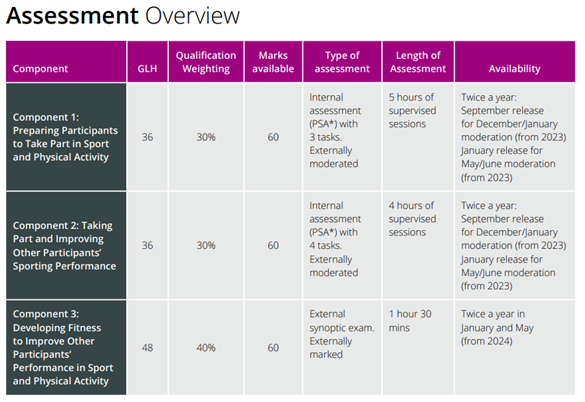 Specification: Sport (2022) | BTEC Tech Award | Pearson qualifications
Specification: Sport (2022) | BTEC Tech Award | Pearson qualifications The GCSE Religious Studies qualification is designed to develop pupils knowledge of religious and non-religious beliefs, such as Christianity, Judaism, Atheism and Humanism. Pupils will also develop the ability to construct well argued, well informed, balanced verbal and written responses. This course will challenge pupils to reflect upon their own beliefs and values and give them the opportunity to explore their own views which will help contribute to their preparation for adult life.
What does the course involve? There are three areas of study as outlined below: Area of study 1: Religious, Philosophical and Ethical Studies in the Modern World Written examination: 2 hours (50% of qualification) Topics include:- Issues of Relationships (including sex, contraception, cohabitation, marriage, divorce, homosexuality).
- Issues of Life and Death (including abortion, euthanasia, creation, the environment, animal rights, the afterlife).
- Issues of Good and Evil (including crime and punishment, forgiveness, the death penalty, suffering).
- Issues of Human Rights (including human rights, social justice, prejudice and discrimination, poverty).
- Beliefs and teachings (including God, the life of Jesus, the afterlife, creation).
- Practices (including forms of worship, sacraments, pilgrimage and celebration, the worldwide church).
- Beliefs and teachings (including God, Messiah, the afterlife, creation, life on earth).
- Practices (including forms of worship in Britain and elsewhere, the synagogue, festivals, rituals, daily life).
RS Learning Journey

Specification:
| Biology | Chemistry | Physics | |||||
| Year | Paper | Topic title | Contents | Topic title | Contents | Topic title | Contents |
| 9 | 1 | Communicable diseases (B5) | Health and disease Pathogens, bacterial , viral, fungi and protists Human defence responses | Atomic Structure and Periodic Table (C1 and C2) | Atoms, structure and history of model development Chemical equations Separation techniques Ions and isotopes Development of the Periodic Table Electronic structure and the Periodic Table Group 1 Alkali Metals Group 7 Halogens Explaining trends | Energy resources (P3) | Energy demands Energy from wind and water Power from the Sun and the Earth Energy and the environment Big energy issues |
| 9 | 1 | Non-communicable diseases (B7) | Cancer Smoking and the risk of disease Diet, exercise and disease Alcohol and carcinogens | ||||
| 10 | 1 | Preventing and treating disease (B6) | Vaccination Antibiotics and painkillers Discovering and developing drug | Structure and Bonding (C3) | States of matter Atoms into Ions Ionic bonding and compound properties Covalent bonding and properties of simple molecules Giant covalent structures Fullerenes Metallic bonding | Conservation and dissipation of energy (P1) | Changes in energy stores Conservation of energy Energy and work Gravitational potential energy stores Kinetic energy and elastic energy stores Energy dissipation Energy and efficiency Electrical appliances Energy and power |
| 10 | 1 | Cell structure and transport (B1) | Microscopes Animal and plant cells Eukaryotic and prokaryotic cells Specialist cells Diffusion, osmosis and active transport. | Chemical calculations (C4) | Relative masses and moles Equations and calculations Concentrations | Energy transfer by heating (P2) | Energy transfer by conduction Specific heat capacity Heating and insulating buildings |
| 10 | 1 | Cell Division (B2) | Cell division Growth and differentiation Stem cells | Chemical changes (C5) | Reactivity series Displacement reactions Extracting metals Making salts Neutralisation and the pH scale Strong and weak acids | Electrical Circuits (P4) | Current and charge Potential difference and resistance Component characteristics Series and parallel circuits |
| 10 | 1 | Organisation and the digestive system (B3) | Tissues and organs The human digestive system The chemistry of food Enzymes and factors affecting their action. Digestive enzymes | Electrolysis (C6) | Electrolysis of molten and aqueous ionic compounds Aluminium extraction | Electricity in the home (P5) | Alternating current Cables and plugs Electrical power and potential difference Electrical currents and energy transfer Appliances and efficiency |
| 10 | 1 | Organising and animals and plants (B4) | The blood and blood vessels Heart Breathing and gas exchange Tissues and organs in plants Plant transport systems, evaporation and transpiration. | Energy changes (C7) | Exothermic and endothermic reactions and their uses Reaction profiles Bond energy calculations | Molecules and matter (P6) | Density States of matter Changes of state Internal energy Specific latent heat Gas pressure and temperature |
| 10 | 1 | Photosynthesis (B8) | Rate of photosynthesis How plants use glucose | Radioactivity (P7) | Atoms and radiation The discovery of the nucleus Changes in the nucleus More about alpha, beta and gamma radiation Activity and half life | ||
| 10 | 1 | Respiration (B9) | Aerobic respiration The response to exercise Anaerobic respiration Metabolism and the liver | ||||
| 10/11 | 2 | The Human nervous system (B10) | Principles of homeostasis Structure and function of the nervous system Reflex actions | Rates and equilibrium (C8) | Rates Collision theory Effects of surface area, temperature, concentration and catalysts Reversible reactions Dynamic equilibrium and altering conditions | Forces in balance (P8) | Vectors and scalars Forces between objects Resultant forces Centre of mass The parallelogram of forces Resolution of forces |
| 10/11 | 2 | Hormonal coordination (B11) | Principles of hormonal control and negative feedback Control of blood glucose Diabetes Human reproduction Hormones and the menstrual cycle The artificial control of fertility Infertility treatments | Crude oil and fuels (C9) | Hydrocarbons Fractional distillation Burning Hydrocarbons Cracking hydrocarbons | Motion (P9) | Speed and distance-time graphs Velocity and acceleration Analysing motion graphs |
| 11 | 2 | B13 Reproduction | Types of reproduction Cell division DNA and the genome Inheritance Inherited disorders | Analysis (C12) | Pure substances and mixtures Chromatography Testing for gases | Force and motion (P10) | Force and acceleration Weight and terminal velocity Forces and braking Momentum Forces and elasticity |
| 11 | 2 | B14 Variation and evolution | Variation Evolution by natural selection Selective breeding Genetic Engineering Ethics of genetic technologies | The Earth’s atmosphere (C13) | History and evolving atmosphere Greenhouse gases and effect Climate change Pollutants | Wave properties (P12) | The nature and properties of waves Reflection and refraction |
| 11 | 2 | B15 Genetics and evolution | Evidence for evolution Fossils and extinction Antibiotic resistant bacteria Classification | The Earths resources (C14) | Finite and renewable Treating water Extracting metals Life cycle assessments Reduce, reuse and recycle | Electromagnetic waves (P13) | The electromagnetic spectrum Communications X-rays in medicine |
| 11 | 2 | B16 Adaptations, interdependence and competition | Communities Organisms in their environment Distribution and abundance Competition in animals and plants Adaptations in animals and plants | Electromagnetism (P15) | Magnetic fields Magnetic fields of electric currents | ||
| 11 | 2 | B17 Organising an ecosystem | Feeding relationships Materials cycling The Carbon cycle | ||||
| 11 | 2 | B18 Biodiversity and ecosystems | The human population explosion Land, water and air pollution Deforestation and peat destruction Global warming Maintaining biodiversity | ||||

